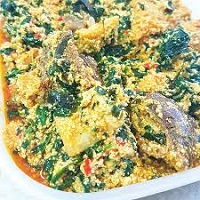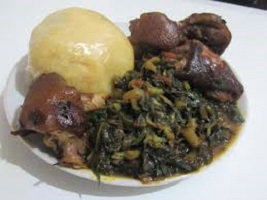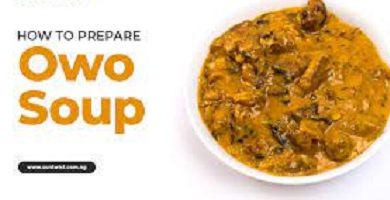Nigerian Egusi Soup: The Best Guide to Making a Soup Recipe
Nigerian Egusi Soup: The Best Guide to Making a Nigerian Recipe
Introduction on how to cook the traditional Egusi Soup
Egusi soup is undoubtedly one of the most beloved dishes in Nigerian cuisine.

This rich, flavorful, and nutritious soup is prepared with ground melon seeds and is enjoyed by many ethnic groups across Nigeria, each adding its unique twist to the recipe.
Having explored various styles of making Egusi soup, I have come to appreciate the versatility of this West African delicacy.
Whether you like it lumpy, smooth, or as Egusi Ijebu, you’re in for a treat!
Nigerian Egusi Soup: What is Egusi?
Egusi refers to the protein-rich seeds derived from certain species of melon, squash, and gourds.
When dried and ground, these seeds become a fundamental ingredient in many West African dishes.
In Nigeria, Egusi soup is a staple often paired with pounded yam, eba, fufu, and other swallow dishes.
Its nutty flavor and creamy texture make it an irresistible choice for those who enjoy hearty meals.
Ingredients Needed for a Delicious Nigerian Egusi Soup
To prepare a tasty and satisfying pot of Egusi soup, you will need:
- Egusi (melon seeds): The primary thickening agent that gives the soup its distinct taste and texture.
- Palm oil: Adds a vibrant color and deep, earthy flavor to the dish.
- Protein sources: Options include beef, goat meat, dried fish, stockfish, chicken, or turkey.
- Crayfish: Provides an authentic, rich seafood flavor.
- Locust beans (iru): Enhances the umami taste. If unavailable, you can substitute with seasoning cubes.
- Leafy greens: Common choices include spinach, bitter leaves, fluted pumpkin leaves (Ugwu), or waterleaf.
- Pepper mix: A blend of red bell peppers, habanero peppers, Fresno peppers, and onions for heat and flavor.
- Onions: Adds depth and sweetness to the dish.
- Stock cubes and salt: For seasoning and enhancing taste.
- Beef or chicken stock: Enriches the soup’s overall flavor.
Step-by-Step Guide to Cooking Egusi Soup
Step 1: Prepare the Egusi Paste
- Blend the Egusi seeds with some onions and a small amount of water to form a thick paste.
- Set aside for use later in the cooking process.
Step 2: Prepare the Pepper Mix
- Blend red bell peppers, habanero peppers, Fresno peppers, and onions.
- Use minimal water to achieve a thick consistency.
3: Heat the Palm Oil
- In a large pot, heat palm oil over medium heat, but do not overheat or bleach it.
- Add chopped onions and locust beans, sautéing for about 3 minutes to release flavors.
Step 4: Fry the Pepper Mix
- Pour the blended pepper mix into the pot and stir continuously.
- Allow it to cook for about 15 to 20 minutes until the raw taste disappears.
Step 5: Add the Egusi Paste
- Gently introduce the Egusi paste into the pot without stirring immediately.
- Allow it to curdle for 15 to 20 minutes before stirring lightly.
- Add some stock and your choice of protein (meat or fish).
- Let it cook for another 15 minutes, stirring occasionally.
6: Add Seasoning and Leafy Vegetables
- Mix in the remaining locust beans, beef stock, and salt to taste.
- Allow to simmer for another 5 minutes.
- Stir in the leafy vegetables and cook for another 5 minutes, stirring frequently.
Alternative Method: Cooking Egusi Soup with Bitterleaf
For a traditional twist, substitute Spinach/Ugu/Uziza leaves with bitter leaves.
Follow the same process, ensuring the bitter leaves are well-washed to remove excessive bitterness.
How to Serve Egusi Soup
Egusi soup pairs wonderfully with Nigerian swallows such as:
- Pounded yam
- Eba (garri)
- Semovita
- Amala
- Fufu
For an unconventional option, you can serve Egusi soup with white rice or rice and beans for a satisfying meal.

Frequently Asked Questions
- Can I use vegetable oil instead of palm oil? Palm oil is highly recommended for its traditional taste and color, but vegetable oil can be used as an alternative. However, olive oil is not advisable as it alters the authentic flavor.
- Can I add tomatoes to the pepper mix? Yes, adding tomatoes is optional and depends on personal preference.
- How do I store Egusi seeds? Keep them in an airtight container at room temperature or in the freezer to prevent rancidity.
- How long does Egusi soup last? Stored in an airtight container, it can last up to 4 days in the fridge or 3 months in the freezer.
Tips for Making the Best Egusi Soup
- If you’re vegetarian, substitute meat with mushrooms and use vegetable broth.
- Reduce palm oil if concerned about calorie intake.
- Use as many leafy greens as you like for added nutrition.
- Blend the pepper mix with minimal water to reduce cooking time.
Conclusion
Egusi soup is a delightful and nutritious dish showcasing West African cuisine’s richness.



Pingback: Pepper Soup Ghana: How to Make Authentic Ghanaian Light Soup - 9jafoods